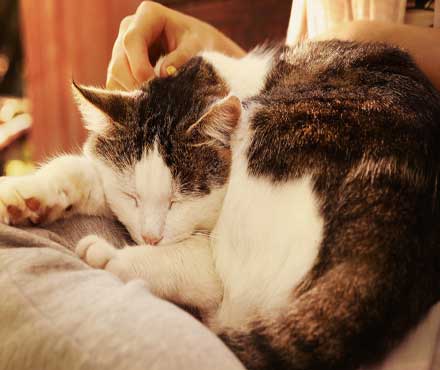Therapy Cats: The Power of the Meow

Cats are more than just our feline friends that we love and enjoy coming home to after a long day; they can provide healing therapy. Many people believe that dogs are the only therapy animals, and this is understandable because dogs are the majority of therapy pets. However, what many people don’t know is that cats are also incredible therapy animals, all through the power of the meow.
Benefits
Therapy cats provide immense benefits to many different people ranging from students stressed about schoolwork to patients in hospitals. These special feline friends will provide a sense of relaxation and comfort to whoever they meet.
Purring: we all know the sound and accompanying vibration. It turns out that purring has healing properties that can reduce depression, anxiety, and can also lower blood pressure. Even as amazing as this is, the vast benefits of therapy cats do not stop here!
Therapy cats also provide incredible benefits to children with autism. In 2012, a study was conducted by French researchers that examined the effect that therapy cats had on autistic children. The results were incredible: therapy cats helped improve the prosocial behaviors of children with autism aged five and up. Additionally, the children displayed more positive effects such as smiling, laughing, and less self-focused behaviors.
Qualities
The most important quality of a therapy cat is his personality. He must be tame, calm, gentle, and sweet in order to provide therapy to those in need. Additionally, it is important that he is comfortable with other people and pets. Because his environment will constantly be changing, he must also be readily and easily adaptable to all different kinds of surroundings such as hospitals, schools, or even jails.
Registration

Do you think that your cat would make a great therapy pet? Well, there are a few steps you and your cat can take to become registered. Firstly, do some research and choose a pet therapy program to receive registration through, such as the very popular Pet Partners program. Look at the program’s website and determine if you and your cat meet the program’s requirements. If you do, then it’s time to sign up and begin registration!
To achieve certification through Pet Partners, you and your cat will have to complete a few steps: a handler course, a health screening, a team evaluation, and a volunteer agreement. Each of these steps will vary with whichever program you choose; however, regardless of the process, all therapy pet programs will be equally rewarding and beneficial in the end.
Cats have proven their immense therapeutic abilities time after time. If you are considering registering your cat as a therapy pet, go for it! Seeing all the smiles that your cat creates will be well worth the experience.
Sources:
- http://journals.plos.org/plosone/article?id=10.1371/journal.pone.0041739
- https://www.medicaldaily.com/children-autism-can-become-more-social-cat-their-side-343684
- https://www.disabled-world.com/disability/serviceanimals/cats.php
- http://www.catster.com/lifestyle/how-to-certified-therapy-cat
- https://petpartners.org/
Previous article

Next article

Related posts
View all-

How to Keep Your Pet Calm During Thanksgiving
Thanksgiving is a time for family, friends, and food, but for our pets, the holiday can be overwhelming. The sudden change in routine, unfamiliar faces and scents, and increased noise can trigger significant stress. Understanding why your pet might feel anxious is the first step toward creating a peaceful holiday experience for everyone, including your furry family members. This guide offers calming tips for pets and practical solutions to ensure your dog or cat feels safe and secure during the festivities.
Read Article -

Top Travel Essentials for Pets This Holiday Season
Holiday travel often means bringing the whole family along, and for many of us, that includes our furry companions. Preparing for holiday pet travel is about more than just packing a bag; it's about ensuring your pet's safety, comfort, and happiness from the moment you leave home until you return. A little planning helps reduce stress for both you and your pet, making the journey a positive experience for everyone involved.
Read Article -

Best Leashes and Collars for Daily Walks: A Pet Parent’s Guide
A daily walk with your dog isn't just a chore—it's a chance to bond, explore, and stay active together. The right leash and collar can make every walk safer and more enjoyable for both of you. With numerous styles and materials available, it's essential to find gear that suits your dog's needs and your lifestyle.
Read Article



